JWF Fund 2016
Japan Water Forum (JWF) Fund managed through fees from corporate and individual members and donations is the initiative that supports grass-roots organizations to address water-related issues in developing countries. Since its establishment in 2005, 150 projects have been carried out so far.
In the JWF fund of this year, we have received 560 applications from 45 countries.
As the result of selection, we have decided to provide funds for 6 projects from 5 countries.
Application Period: 1 June to July 31 2016
Number of the Applications: 560 projects from 45 countries
Selected projects: 6 projects from 5 countries; Togo (1), Madagascar(1), Tanzania (1), Pakistan (1), and India (2)
Recipients of JWF Fund 2016
1.
| Organization | CHARITÉ CHRÉTIENNE POUR PERSONNES EN DÉTRESSE (CCPD) (#015) |
| Project Name | Construction of 1 shallow well, 1 ecosan toilet and 1 hand washing facility, and holding of 3 training in WASH programs in the community of Lavié-Apedome |
| Country/Area | Togo/Lavié-Apedome |
| Project period | November 2016 to March 2017 |
| Number of beneficiaries | 290 people (100 women, 55 men and 135 children) |
| Cost | 2,200 USD (JWF Fund 1,000USD, contributions from local residents 1,200 USD) |
Background
Water and sanitation in the area is in a difficult situation because there is neither water supply system nor sanitation facility. People fetch water from ponds and defecate in the open. One particular problem of the area is that the groundwater level is close to the ground surface. When it rains, water flows into yards roads and open aqua privy. Contaminated water are soaked into groundwater and it causes pollution of groundwater as well as water points. The environment becomes the breeding ground for diseases to spread easily. The lack of access to clean drinking water and proper sanitation facility create a significant amount of illnesses and deaths every year. The area had cholera epidemics several times which caused more suffering and deaths among women and children who are the most affected. Exposed groundwater sources are contaminated in many places and there is no safe source of water for people to get clean water for their daily use.
Contents of the project
Construction of 1 shallow well, 1 ECOSAN toilet and 1 hand washing facility, trainings on WASH (3), establishment of water committee for maintenance
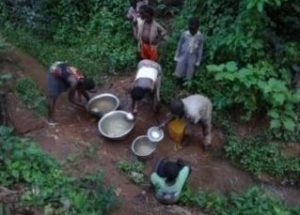 |
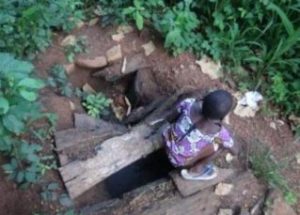 |
| Water point is dirty and people step into water with their shoes. | When it rains, water soaks excreta and pollutes water points. |
2.
| Organization | Human Development Promotion Group (HDPG) (#168) |
| Project Name | Community Led Water & Hygiene Promotion Project in Tarkha village, UC Haji Zai , District Charsadda, KPK Province-Pakistan |
| Country/Area | Pakistan/Charsadda |
| Project period | November 2016 to January 2017 |
| Number of beneficiaries | 1,392 people (348 women, 348 men, 696 children) |
| Cost | 2,050 USD (JWF Fund 994 USD, contributions from local residents and HDPG 1,056USD) |
Background
According to the result of the assessment survey conducted on 5th July 2016, the community does not have adequate access to safe drinking water. Although there are open wells and electric pump dug wells for the community, the depth (20 to 30 feet) of wells are not deep enough to get safe water. HDPG survey team interviewed 100 members of the community and found out that the non-availability of drinking water to nearly 60 % of the village population is a potential threat for water borne diseases. The proposed project will provide them the facility to use clean drinking water from the hand pumps dug up to 80 feet.
Contents of the project
Construction of 2 well with hand pump, implementing health and hygiene awareness sessions and establishment of Operation and Maintenance Committee
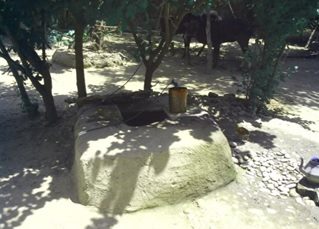 |
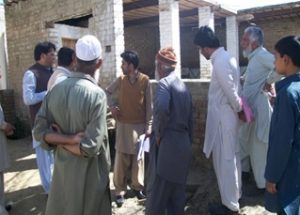 |
| An open well used in the village | HDPG survey team visited and interviewed people in the village about wells and water condition. |
3.
| Organization | PHD Rural Development Foundation (#449) |
| Project Name | Promote WASH in Schools through Refurbishment of Toilets & Drinking Water System and Construction of a Hand Washing Station in Rajasthan, India |
| Country/Area | India/Sikar District |
| Project period | November 2016 to February 2017 |
| Number of beneficiaries | 272 people (140 girls, 120 boys and 12 teachers) |
| Cost | 1,092 USD (JWF Fund 1,000 USD, contributions from PHD Rural Development Foundation 92 USD) |
Background
The difficulty to access water and the low per-capita income of the district have impacted the sanitation conditions among the rural population including the schools, where existing sanitation facilities are in a deplorable condition and cannot be used by students. Poor financial resources have prevented rehabilitation of old broken sanitation structures. Students cannot use the toilet because of lacking water. A lack of funds and water connection has led to its long-term neglect and excessive damage. This causes absenteeism, especially of girls. Girls have to go home to use toilet and the boys defecate in the open.
Contents of the project
Refurbishment of toilets, installing drinking water station and hand washing station
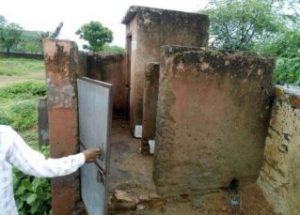 |
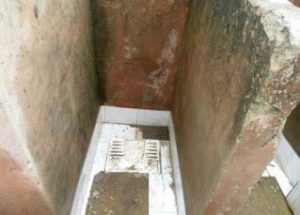 |
| A toilet facility to be rehabilitated | Inside of the toilet. Damaged walls and floor, no provision of water |
4.
| Organization | Grassroots Climate and Livelihood Actions (GRACLIA) (#108) |
| Project Name | Clean water and WASH education for the Ampandroantsiriry’ community |
| Country/Area | Madagascar/Antsinanana |
| Project period | November 2016 to March 2017 |
| Number of beneficiaries | 600 people (170 women, 180 men, 250 children) |
| Cost | 977.5 USD (JWF Fund 977.5 USD) |
Background
Madagascar has approximately 22 million populations, with the majority, which represent 80% of the population, living in rural areas, where the minimum of public services and facilities are almost inexistent. In the village of Ampandroantsiriry, due to a lack of access to clean water the local people, especially women and children have to walk hundreds meters from their village to nearby streams to wash their dishes and clothes, and fetch water. The stream is used by the local community as main source of water for drinking and cooking. On the other hand, addition to washing dishes and clothes, the majorities of the communities’ members defecate in the surrounding areas since there is no toilet facility. As a result the local community is exposed to infections such as cholera, diarrhea, and typhoid. Furthermore, there is a dumping site few hundred meters upstream which pollutes water stream.
Contents of the project
Installing 3 hand pumps, establishment and building framework of maintenance team, 3 workshops and trainings on solution of water purification
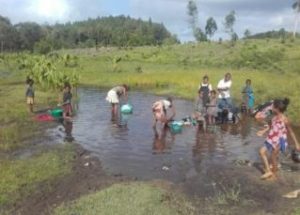 |
 |
| Water stream used for drinking water resource and washing place | Upstream of the stream used as a dumping site cause water pollution |
5.
| Organization | Tanzania Environment Management Catalyst (#030) |
| Project Name | Construction of Rain Water Harvesting Systems and Improved Pit Latrines at Ndenyende Primary School in Tunduru district, southern Tanzania |
| Country/Area | Tanzania/Tunduru |
| Project period | November 2016 to March 2017 |
| Number of beneficiaries | 450 pupils (246 girls, 204 boys) |
| Cost | 2,000 USD (JWF Fund 1,000USD, contributions from beneficiaries and the organization 1,000 USD) |
Background
Ndenyende village with more than 3,800 people has one primary school with more than 450 pupils from standard 1-7 grade and 10 teachers.
The village and the school depend their water sources from rivers located 5 to 7 kilometers north (Nanyungu river) and south (Matikwili river). There is no fresh water at the school to drink and wash hands. Few pupils carry plastic bottles filled with water for drinking from their homes. The bottled water is unboiled. The risk for waterborne diseases is very high for the pupils and is a cause of school absenteeism. The school does not have a safe sanitation facility. Although there are grass-fenced toilets, using the toilets in the rainy season involves danger for pupils. A lack of water prevents them from washing hands after using the toilets. There is an urgent need to construct a rainwater harvesting infrastructure and a safe sanitation facility at the school.
Contents of the project
Construction of 2 rainwater tanks and 10 VIP toilets, building framework of operation and maintenance, education on sanitation and health
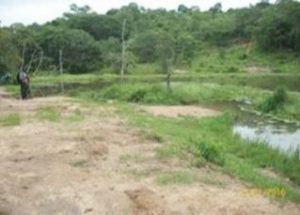 |
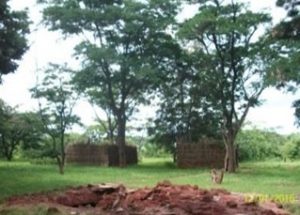 |
| Pupils fetch water from the river | Grass-fenced pit toilets |
6.
| Organization | PRAGATI KORAPUT (#424) |
| Project Name | Rain water Harvesting for water conservation and dry land farming for tribal farmers |
| Country/Area | India/Koraput |
| Project period | November 2016 to April 2017 |
| Number of beneficiaries | 90 people (18 families) |
| Cost | 1,345 USD (JWF Fund 983USD, contributions from local residents and PRAGATI KORAPUT 362 USD) |
Background
There are 18 small and marginal farmers who have their agriculture field of 17.5 acres where they grow millets, vegetables and pulses during the rainy season. In addition to sloped and undulating land, due to torrential rains with intensity of 150 to 200 mm per hour, heavy runoff of rainwater causes soil erosion and damages crops of the farmers almost every year. Contrary, with the end of monsoon rains, the lands become dried up, as the moisture retention capacity is very low. Due to the undulating topography, it make the lands unsuitable for agriculture. Over the years, due to erosion of topsoil and leaching of micronutrients, the productivity of the lands has been declining. Hence the farmers, owning these lands are even reluctant to grow crops even during the rainy season, rather they prefer to work as wage laborers in the nearest town to earn their living. Some of the farmers also earn their living by selling firewood and charcoal which causes deforestation.
Contents of the project
Construction of rain water harvesting structure, raising awareness of farmers and building framework of operation and maintenance
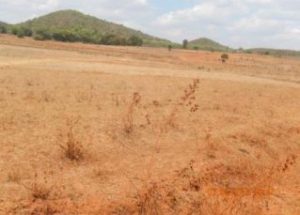 |
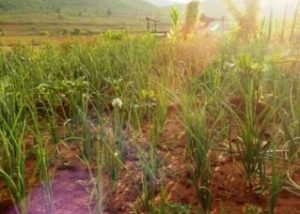 |
| Agriculture field in the dry season | Growing crops during the rainy season |
